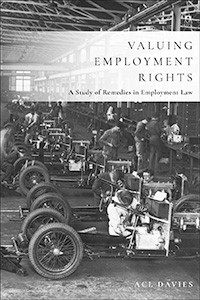
Author: Professor ACL Davies
Publisher: Hart Publishing
ISBN: 9781509955268
RRP: £76.50
The remedies available to workers for breaches of their rights may be at the less glamorous end of employment law but are crucial issues for both workers and their employers. Without clarity as to the consequences of breach or effective enforcement, the objectives of statutory and other employment law protections are unlikely to be realised. A detailed understanding of the principles behind, and operation in practice of, the remedies provided by employment law is essential for any student of or practitioner in the area.
In Valuing Employment Rights: A Study of Remedies in Employment Law, Professor ACL Davies (who was one of this reviewer’s PhD examiners) treats employment law remedies ‘as a lens through which to view employment rights and understand their treatment in the legal system’. This work analyses, across the panoply of









